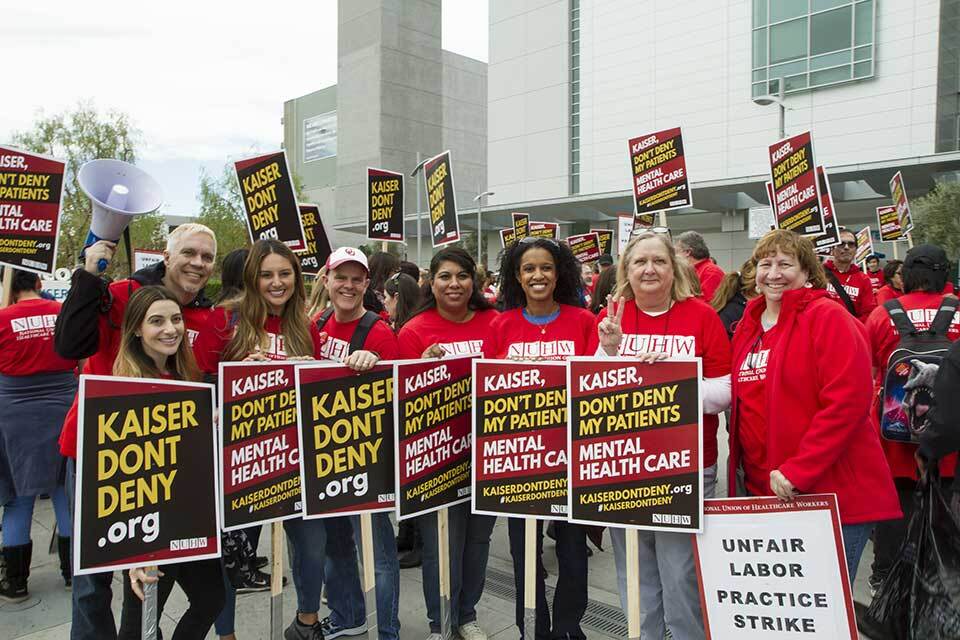By Lily Krauss, PhD Clinical Psychologist at Kaiser Permanente National Union of Healthcare Workers Member
Growing up in the Bay Area, I have received care from many wonderful Kaiser healthcare providers throughout my life. When I had the opportunity to work for Kaiser as a child psychologist in the North Bay, I jumped at the opportunity. Even though I knew that Kaiser had a poor reputation for mental health care, I thought we could make positive changes with our dedicated and skilled team.
Unfortunately, I learned the hard way that Kaiser executives do not seem interested in collaboration or improving mental health care services. For years, I saw patients struggle to access the care they need and deserve. For the first time in my career, I found myself having to apologize to patients who had to wait months to start treatment that should have been available to them much earlier.
Since the pandemic things have gone from bad to worse. Demand for care has soared, while working conditions have deteriorated. We work so hard to make a difference in a system that sets us and our patients up to fail.
"Instead of providing mental health care, I felt like Kaiser was gatekeeping."
Kaiser mental health clinicians who work with youth tell @capitalandmain that children may suffer even more than adults from delays in treatment.https://t.co/WubGTslcjy
— Capital & Main (@capitalandmain) September 7, 2022
A growing number of my colleagues have left because they are unable to remain in a system that does not allow them to meet the needs of their patients and perpetuates chronic burnout. Each departure leaves a hole both for our patients and our team who relies heavily on one another for support, collaboration, and morale. According to figures collected by our union, from June 1, 2021 through the end of May 2022, 377 mental health clinicians left Kaiser’s Northern California region — more than double the number who left during the previous 12-month period. Kaiser talks about how many people it is “hiring” but never mentions how many people are leaving or what those departures mean for Kaiser patients, or the staff who remain. Many people ask why we stay –for our patients who are not able to access care outside their insurance, our colleagues, and our communities.
Kaiser Permanente, CA’s largest healthcare provider, turned a company record profit of $8.1 billion in 2021.
In early August, shortly before our strike began, my schedule was so overbooked, I did not have an available intake appointment for a new patient until November. Most of my colleagues are only able to see their patients for individual therapy sessions every 4-8 weeks, and while some patients are able to access weekly groups, many are not. This lack of access to timely care not only violates every clinical standard, it also violates state law.
IS KAISER ABIDING BY CALIFORNIA’S NEW LAW REQUIRING PATIENTS TO RECEIVE THERAPY WITHIN 10 BUSINESS DAYS? No. Internal Kaiser documents show that patients who received an initial mental health assessment on June 13 weren’t scheduled for follow-up appointments for a month in San Francisco, more than two months in Sacramento and three months or more in other parts of Northern California.
Despite the many systemic issues, I still believed that we could work with Kaiser to make things better. Over the last couple of years my colleagues and I worked within regional teams to identify and create workflows to create improvements in local clinics. In 2020, we had a labor-management Model of Care committee that came up with joint recommendations for improving access to care, but Kaiser’s top management never acted on them. It was demoralizing to see our hard work dismissed.

More than 2,000 mental health therapists striking for as long as it takes to make Kaiser fully staff its clinics and end dangerously long wait times for therapy.
When we went into bargaining for a new contract in July 2021, we put a full proposal on the table during our first session that focused on the model of care recommendations including increased staffing, improved access to treatment, and retaining therapists. It took Kaiser’s representatives several months just to respond to our proposal. Time and time again over the last year I would hear that my earnest and dedicated colleagues who had rearranged their entire caseloads to be at bargaining sessions had waited for hours for Kaiser delegates to meet only for them to reject every proposal, and not provide any of their own. Meanwhile, patients are waiting longer than ever for care, and clinicians keep leaving in droves because the work is unsustainable and patients continue to suffer.
We have been on strike since Aug. 15. It’s hard to go weeks without pay. It is even harder to not be able to see our patients and know that Kaiser has been canceling appointments instead of finding them care as legally required. It is appalling that Kaiser, with $8.1 billion in net profits last year alone, has refused to adequately fund mental health care. Even though Kaiser claims to their members and to the media to be bargaining in good faith, we entered our 4th week on strike without Kaiser returning to negotiations.
We want to come back to patients whom we care so deeply about, and the work that we love and have dedicated our lives to. Every day on the picket lines we think about our patients, and yet we are not willing to continue to work in a system that is failing them. Right now, our only choice is to fight to change the mental health system at Kaiser, and that is what my colleagues and I intend to keep doing.
More Strike Info: https://nuhw.org/kaiser–dont-deny/kaiser-strike/ Donate to local strike funds: https://nuhw.org/kaiserstrikefund/
UPDATE 9/8/22 7AM: NUHW President Sal Rosselli told the press the union’s bargaining team will meet with Kaiser on Thursday, 9/8/2022.
#Kaiser will return to #contract #talks with @NUHW local with 2,000-plus Northern #California #mentalhealth workers who have been on #strike since Aug. 15. #kaiserdontdeny #behavioralhealth #kaiserpermanente https://t.co/XeqthkMiUP
— [email protected] (@CathieA_SacBee) September 7, 2022
LIKE THIS POST? THEN YOU’LL LOVE STUART’S NEW ZINE!

Get this limited edition, hand signed zine covering 20 years of Stuart’s writings on San Francisco! Learn more right here.
The post Kaiser Therapists Continue Strike Against Dangerously Long Wait Times for Therapy appeared first on Broke-Ass Stuart's Website.








